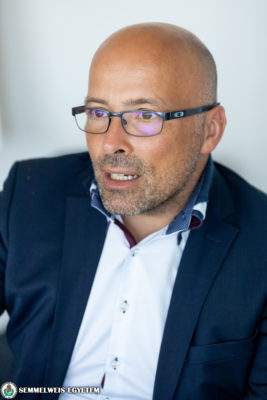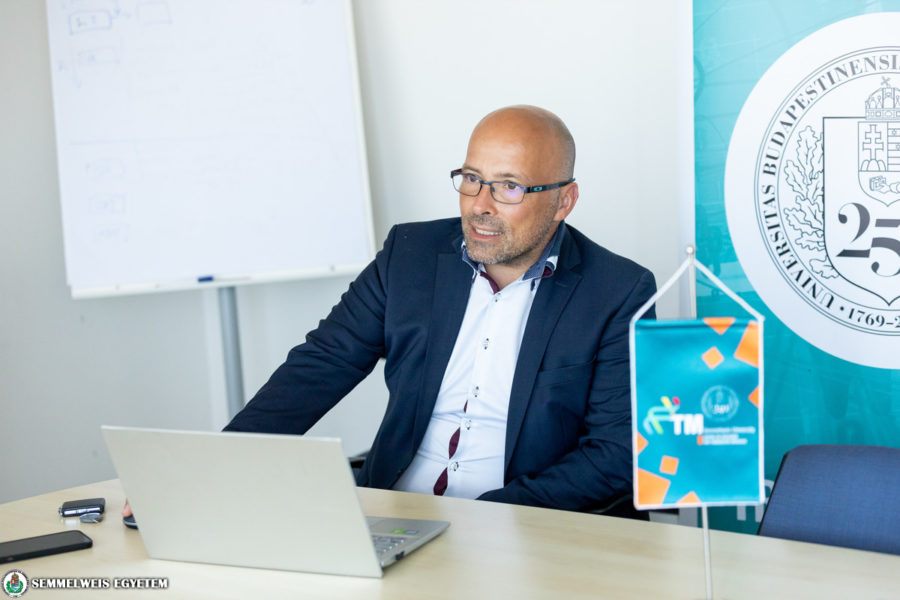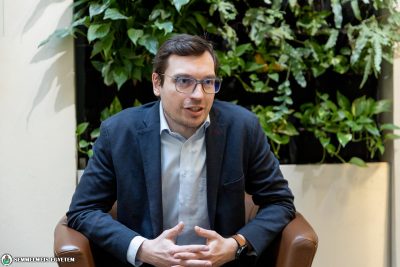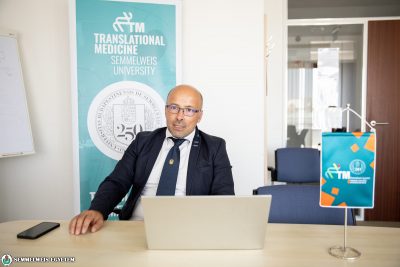 The Center for Translational Medicine was established on 1 June 2021 on the basis of a decision by the Senate of Semmelweis University with the purpose of launching a new academic program in the field of translational medicine. The center is under the supervision of the vice-rector for science and innovation and was established to support research, development and innovation as a whole. Director dr. Hegyi who relocated to Semmelweis University from the city of Pécs, emphasized: the new establishment is open to all students coming from different departments and aspires to keep close collaboration within the education of doctors and researchers. Translational research aims to turn results immediately to the benefit of patients and this requires that all professionals involved in patient care, including doctors, pharmacists, dietitians and physiotherapists have the knowledge to do so.
The Center for Translational Medicine was established on 1 June 2021 on the basis of a decision by the Senate of Semmelweis University with the purpose of launching a new academic program in the field of translational medicine. The center is under the supervision of the vice-rector for science and innovation and was established to support research, development and innovation as a whole. Director dr. Hegyi who relocated to Semmelweis University from the city of Pécs, emphasized: the new establishment is open to all students coming from different departments and aspires to keep close collaboration within the education of doctors and researchers. Translational research aims to turn results immediately to the benefit of patients and this requires that all professionals involved in patient care, including doctors, pharmacists, dietitians and physiotherapists have the knowledge to do so.
Every year, there are around 1.4 million scientific publications worldwide and to be able to integrate research findings into everyday clinical practice and patient care, professionals need to be able to filter information in the most efficient and fastest way possible. Therefore, meta-analysis and statistics are also part of the study program.
“We aim to improve scientific activity with the help of the clinical and practical, “bedside” experience. Students get to know the scientific methodology and science based patient care. A good medical doctor has to do scientific work too. We seek to have qualified doctors at every level of patient care who possess this kind of knowledge, thus increasing the quality of healthcare and cost-efficiency,” Dr. Péter Hegyi said.
Dr. Hegyi is the first author of a recently published article in Nature Medicine that also proves the importance of translational medicine as a scientific discipline.
This year 90 out of 161 applicants were admitted, 68 of whom are newcomers to the PhD program, while the rest were already students at the Doctoral School and 50 are also enrolled in specialist training. Dr. Hegyi pointed out that students have different academic background and come from different scientific disciplines. Their primary objective is to become better healthcare professionals.
This year, the Ministry for Innovation and Technology has provided the opportunity for more applicants to join the program by increasing the number of places to 250 (for students sponsored by the Hungarian state). All applying students must choose a research topic and have a doctoral advisor. A first-year student’s schedule is made up of four-day weeks. Students can spend the remaining time on their specialized medical training and healthcare work. In the second year, the ratio of the medical training and classes is reversed. There are also approximately 90 students from the Scientific Students’ Associations participating in the program, which they get school credits for after completing the course.

Dr. Péter Hegyi obtained his medical degree and PhD at the University of Szeged in 1996. At the same time he got enrolled in an internal medicine residency program. He had to interrupt his studies to go to the USA and the United Kingdom, where he spent four years doing research. He led the Wellcome Trust international grant in 2002 and returned to his hometown Szeged to open his own research laboratory. During his medical training in internal medicine he also passed the gastroenterology certification exam.
The pilot program of translational medicine was launched at the University of Pécs with a smaller group of students. This has been expanded to a university level here at Semmelweis University. Given dr. Hegyi’s experiences in the field of pancreatitis, he has seen that only a small number of scientific research results are integrated into the medical practice of treating the disease. The establishment of an academic program specialized in Translational Medicine was made possible under the Lendület (“Momentum”) Program of the of the Hungarian Academy of Science. Later in his career dr. Hegyi got the opportunity to carry out scientific research and do medical work by the bedside and at the same time.
He made the decision to come to the Semmelweis Univeristy because of this duality of applied scientific research and practice. At Semmelweis University he could establish an education model for the discipline of translational medicine, and create a unique, multidisciplinary pilot program. This summer, the Senate of Semmelweis University agreed upon the decision to establish a new organizational unit specialized in pancreas related diseases to be built on the site of the parking lot in Mária utca. The institution will serve as a center for both patient care and theoretical research, which is required to reduce the time spent on the overall diagnosis of pancreatic cancer. Before the opening of the new department in Mária utca, a new department specialized in treating pancreatic cancer was temporarily established at the Department of Transplantation and Surgery under the supervision of the Heart and Vascular Center. In addition to treating patients dr. Hegyi is going to continue his scientific research, focusing on how to prevent the development of a chronic disease and cancer in case of pancreatitis.
Pálma Dobozi
Attila Kovács – Semmelweis University
Translation: Norbert Lukács


